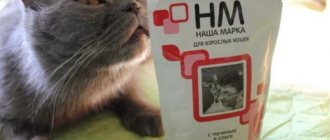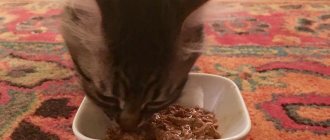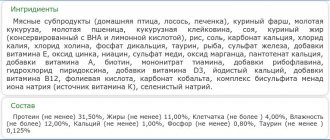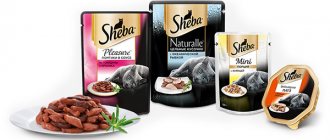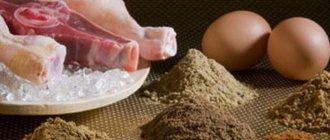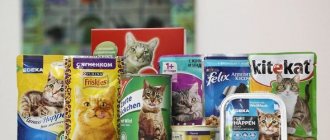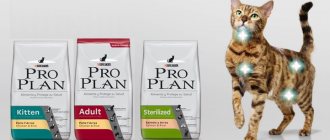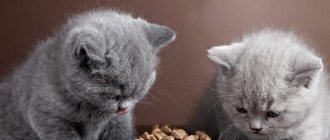What will you learn from the article?
- More about food
- Types of Hills cat food Advantages of food:
- Minuses:
- Hill's dry food:
- Wet food:
- Hills food for kittens (1-12 months):
- Prices
With the arrival of a kitten in your family, the first question arises: what to feed your little pet? There are two options: homemade food or ready-made Hills cat food, by the way, read reviews about it in this article.
More about food
Hill's cat food is a product that belongs to the “super premium” class, produced in the USA and Holland. Available in the form of dry food and canned food. Used as basic nutrition or medicinal formulas.
Despite the “super premium” class, you should make sure that this particular food is suitable for your pet.
If the food is suitable for the kitten, then first of all this can be seen in the fur: it should be beautiful and shiny. Also, the kitten should be active, playful and cheerful. But if you notice a strong odor from your pet’s mouth or from its tray, then refuse this food and try to find a more suitable one.
Kinds
Hills cat food is produced in two product groups. Of course, the choice in medicinal products is much richer, and these Hills foods are classified as super premium, because initially the manufacturer focused specifically on them. However, this does not mean that the everyday line for cats in the premium segment is of worse quality.
Both lines of food are available in the form of dry food, pouches (disposable packaging for wet kibble), and also in the form of canned food.
All products are categorized as premium and super premium segment.
Medicinal
Clinical nutrition, which is what medicinal foods are called, are united under the general name Prescription Diet. They are developed based on the specific needs of the cat’s body during the treatment of each specific disease in cats. In total, the line offers 16 therapeutic diets for pets. They are prescribed to cats in courses and used until complete recovery.
It is strictly not recommended to use medicinal Hills in the daily menu. Among the dietary foods, you can find food to correct the following health problems:
- Diseases of the urinary system. The following medicinal diets are recommended: c/d multicare (with chicken and fish), k/d, s/d, w/d.
- For liver diseases, food labeled l/d is suitable.
- A large group of gastrointestinal problems in cats can be corrected by Feline r/d, w/d, i/d. The latter food is intended not only for gastrointestinal disorders, but if it is necessary to rehabilitate a cat after long-term treatment or surgery.
- For heart disease, cats are prescribed Feline k/d, l/d.
- Pancreatic diseases in cats and diabetes mellitus cause a change in diet to Feline i/d, m/d, r/d, w/d food.
- There is a special food for severe arthritis - Feline j/d.
- Kidney diseases can be treated by feeding the cat Feline k/d food.
- Your pet's excess weight can be returned to normal with the help of Feline Metabolic m/d, r/d, w/d.
Feeds have a heterogeneous composition, based on their intended purpose. The range of fluctuations in protein, fat or carbohydrate components reaches 20%. For example, if there are kidney problems, a cat is allowed no more than 32% protein, while diabetes or excess weight, on the contrary, require a high-protein diet - about 50%.
The entire line of cat food can be used at any age of the pet; they are also suitable for sterilized or neutered cats. It is better to contact your veterinarian regarding the use of this or that food.
On every day
Among the foods intended for everyday use by cats, there are several groups based on the age parameters of the pet:
- Hills for kittens is available in three varieties: Kitten Healthy Development (you can choose with chicken or tuna), as well as Young Adult sterilized cat. This is a high protein dry food for a growing and active kitten. At the same time, for sterilized kittens their content is lower: 40% and 34%, respectively;
- For adult cats, the diet is, of course, more varied. Feline Adult food provides balanced nutrition for sterilized or neutered pets (Sterilized) and for overweight cats (Light). Cat food has a different composition for sensitive digestion (Sensitive), for home keeping (Indoor), for cats with the opportunity to walk (Optimal Care). Hypoallergenic Sensitive Skin/Stomach will ensure good digestion and healthy skin, and Hairball Control will prevent the formation of hairballs;
- Elderly felines deserve special care. For cats who have crossed the seven-year mark, Mature food has been created. Active Longvity dry food will provide your cat with antioxidants and reduce the risk of kidney problems. Hairball Control will help you gently get rid of hairballs in your stomach. They will solve all problems and satisfy the needs of sterilized cats and neutered cats Sterilized cat.
Types of Hills cat food
For the appearance of Hills and medicinal food in general, we should thank Dr. Morris. It was Mark Morris who was the first to understand that a cat’s well-being depends on the quality of food for a cat and was the first to develop such food. And in 1948, Mark Morris founded the world's first clinical nutrition company for animals.
Today, the Hills brand has already built a strong reputation for itself without lowering the bar of its standards. The company's headquarters remain in Topeka, Kansas.
And Hills cat products include both canned and dry food.
It is important to know that Hill's, producing the right products for your pet, has divided them into two lines:
- Science Plan - healthy nutrition, which is aimed at healthy and active animals
- Prescription Diet - therapeutic nutrition, in demand when your pet is feeling unwell
Interesting:
- what to feed the cat;
- cat food rating;
- Is dry food harmful for cats?
Pros of food:
- affordable prices;
- a wide selection of feeds (including medicinal ones);
- suitable for most cats;
- the composition of the feed is detailed on the packaging;
- balanced content of phosphorus, calcium and magnesium.
Minuses:
- contains a lot of vegetable protein and carbohydrates;
- your pet may be allergic to food;
- Wet food is inferior in quality to dry food.
Hill's dry food:
- better quality than canned food;
- excellent for storage in dry areas, but may deteriorate in damp areas;
- very nutritious, but requires the kitten to drink a lot of liquid.
Wet food:
- can cause appetite in a pet;
- has a long shelf life in packaging;
- high in calories, as it is enriched with fats.
Which food should you choose for your pet?
The range of healthy foods from Hill's is very diverse. It is designed for kittens, adult cats, and those animals that have reached old age.
Hills food for kittens (1-12 months):
- Science Plan™ Kitten Healthy Development™ "Chicken"
The manufacturer promises that the precise balance of sodium and phosphorus levels in Hill's™ Science Plan™ Kitten Healthy Development™ food, the presence of antioxidants, and the correct level of DHA from fish oil will ideally support the kitten's immunity and vitality.
Available flavors:
- chicken;
– tuna.
- Science Plan™ Feline Young Adult Sterilized Cat “Chicken”
This menu is for kittens that have already been spayed or neutered. To prevent the animal from gaining excess weight and subsequently contracting urolithiasis, the developers of the food have saturated it with minerals that control the functions of the urinary tract; the ingredients of the food are easily digested and this ensures optimal supply of nutrients to the cat’s body.
It will be interesting:
- Royal Canin food reviews;
- Acana cat food reviews;
Hill's food for adult cats (1-6 years):
- Science Plan™ Feline Adult Hairball Control “Chicken”
This menu contains several important items:
– a formula to prevent the formation of hairballs in the cat’s gastrointestinal tract;
– saturation with substances that reduce shedding;
– minerals to maintain a healthy urinary system.
Read more about food for hair removal.
- Science Plan™ Feline Adult Indoor Cat “Chicken”
This position is suitable for pets who do not leave the walls of apartments. After all, cats that constantly live indoors need selected proteins and Omega-3 fatty acids. By the way, this food does not contain many calories, which means it does not affect weight. As a bonus, Hill's™ Science Plan™ Feline Adult Indoor Cat reduces fecal odor.
- Science Plan™ Feline Adult Light “Chicken”
This dish helps keep your cat's waistline. In other words, Hill's™ Science Plan™ Feline Adult Light maintains your cat's ideal weight with high levels of L-carnitine (a substance that helps convert fat into energy). The food also contains a high level of fiber, which means that Science Plan™ Feline Adult Light controls hunger between feedings.
- Science Plan™ Feline Adult Optimal Care™
Hill's™ Science Plan™ Feline Adult Optimal Care™ menu is designed to help keep your cat in optimal physical condition. Here again we see Omega-3 fatty acids, antioxidants, and good mineral saturation.
Available flavors:
- chicken;
- rabbit;
– tuna;
– lamb.
- Science Plan™ Feline Adult Oral Care “Chicken”
This is not just food, it is both food and dentist. Yes, Hill's™ Science Plan™ Feline Adult Oral Care prevents plaque and tartar. Bonus again - Hill's™ Science Plan™ Feline Adult Oral leaves your cat's mouth smelling nice!
- Science Plan™ Feline Adult Sensitive Skin “Chicken”
Suitable for daily consumption, the food prevents skin swelling, dry skin and flaking. After all, Hill's™ Science Plan™ Feline Adult Sensitive Skin contains Omega-3 and 6 fatty acids and natural oils.
- Science Plan™ Feline Adult Sensitive Stomach “Chicken with Egg and Rice”
Hills has released a menu designed to promote healthy digestion in cats. Hill's™ Science Plan™ Feline Adult Sensitive Stomach contains not just proteins, but highly digestible and highly soluble fiber.
- Science Plan™ Feline Young Adult Sterilized Cat “Chicken”
Dishes for adult castrated and sterilized cats. The composition is designed to both control weight and prevent ICD.
Hills food for senior cats (over 7 years):
- Science Plan™ Feline Mature Adult 7+ Active Longevity™
Hill's™ Science Plan™ Feline Mature Adult 7+ Active Longevity™ menu protects the kidneys of older cats and gentlemen. The food is rich in antioxidants (vitamins E, C), it is low in phosphorus, but high in Omen-3 fatty acids.
Available flavors:
- chicken;
– tuna.
- Science Plan™ Feline Mature Adult 7+ Hairball Control “Chicken”
The natural fibers in Hill's™ Science Plan™ Feline Mature Adult 7+ Hairball Control help prevent hairballs from forming in your cat's gastrointestinal tract, while vitamins E and C protect your cat's liver.
- Science Plan™ Feline Mature Adult 7+ Sterilized Cat Chicken
Older pets who have been spayed or neutered will benefit from this position with its unique weight control formula. Read more about food for sterilized cats and neutered cats.
Hills Science Plan Cat Food Review
Science Plan cat food is produced in the Netherlands and the Czech Republic by Hill's Pet Nutrition, Inc.. Official website - (in Russian), https://www.hillspet.co.uk/ (in English).
This food belongs to the premium class. The Science Plan brand also produces dry and wet dog food. The company also produces Ideal Balance, Natures Best, and Prescription Diet foods.
Science Plan food composition
Let's get acquainted with the composition of Science Plan food using the example of the Feline Adult Indoor Cat Chicken option (for adult cats leading a domestic lifestyle). You can see it in the image below, we recommend clicking on it to enlarge it for easier reading:
Top left is a photo of the composition from the packaging. Below is a screenshot of the lineup from the English version of the official website, and even lower and to the right is a screenshot from the Russian version of the official website.
The first ingredient, poultry meal, is a source of protein. It is clarified that “chicken min. 40%,” but it’s not clear - 40% of this ingredient or of the total content? Above the composition it is written “total content of poultry meat min. 53%). But if the food contained 53% “poultry meat”, then this would be indicated in the composition itself. Otherwise, this is nothing more than advertising text.
In many versions, the packaging says “poultry meal”, but in the original description of the composition in English there is no word “meat”, it is simply written “poultry meal”, “chicken and turkey meal”, etc. That is, meat appeared thanks to the miracles of translation into Russian.
Meat meal is made only from meat, while poultry meal can include any part of the bird (since it is not specified what exactly it includes).
Another interesting thing is that on the official Russian website, the English website and on the packaging, the information on the composition is slightly different. For example, the percentage of chicken, data from guaranteed analysis.
Corn is a source of carbohydrates and many amino acids, useful in small quantities. However, when it is one of the main ingredients, it can be considered a cheap food filler. Rice is a good source of carbohydrates.
Corn gluten meal is a source of plant proteins. Cellulose is a thickener. Protein hydrolyzate is a source of protein (it is not clear whether it is plant or animal). Animal fat is a source of saturated fatty acids, and vegetable oil is a source of unsaturated fatty acids.
Potassium chloride, calcium sulfate, salt - all these are different salts. Needed as a flavoring additive, as well as a source of potassium and calcium.
Advantages and disadvantages
Among the advantages of Science Plan food:
- very wide range, there are dry and wet food;
- natural antioxidants and preservatives are used (tocopherols and citric acid);
- good content of vitamins, minerals and other useful substances;
- Widespread, available in almost every pet store.
Among the disadvantages:
- It is not “chicken meal” that is used, but “chicken meal”. The latter probably includes offal, and the word "meat" in the composition appears as a result of the miracles of translation;
- it is not known how much vegetable protein and how much animal protein (and it is impossible to approximately estimate since the % of all protein sources is not indicated);
- relatively high price (there are analogues with a more understandable and high-quality composition and the same cost).
Reviews of Hill's cat food
Karina : “I have British cats that feed on Hills from their young claws. The most appetizing one for them is the one with tuna flavor. Let me note that the transition from baby food to adult food went unnoticed. And I especially focus on the absence of allergies to fish-flavored food. It’s a pity, of course, that the price of the food is expensive, but the good composition and palatability pay for the costs. I now order online in large packages, it’s more profitable.”
Andrey : “I have a cat that falls into the elderly category - she is already 11 years old. For 10 years she ate other foods, but her health was no longer the same, so she took Hills based on the recommendations. The most popular food for my purr is lamb-flavored food. I praise sincerely - in just a month of feeding, the cat’s age-related bald spots began to heal and the peeling of the skin went away. I’ve been feeding it alternately lamb and rabbit for a year now.”
Katerina : “Somehow Hill’s didn’t suit our cat. Moreover, I will not criticize the composition and quality of the food, it’s just that my cat is picky and capricious. He eats just a little Hills, and the rest lies in a bowl until I remove it and add a new portion. So I don’t buy it anymore, which is a pity, because I noticed that feces really don’t stink that much.”
Slava : “I always buy expensive food in the hope that it is automatically good, so Hills comes to us often. What can I say, the cat likes it (of course, for such and such a price). But the tastes quickly become boring, so there is no way to save on large volumes.”
